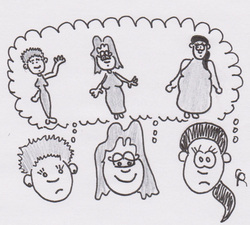
In a study in the Psychology of Women Quarterly, Rachel H. Salk and Renee Engeln-Maddox report that “Fat Talk” or women speaking negatively about the size and shape of their bodies, not only reflects dissatisfaction, but more importantly creates dissatisfaction. When women do this, they don’t picture their individual ideal BMI, body mass index, something against which to set a realistic goal. What they compare themselves to is some idealized fantasy body –beyond reach for most.
While it may seem like healthy bonding for friends to vent about their body dissatisfaction, "the body ideal for women is so unattainable that thinking and talking about body shape and size tends to leave women feeling worse, not better," points out Salk. "Fat talk likely results in more body monitoring, which women are already spending too much time doing."
The study was conducted on college-age women, but middle-agers fall into the same trap. Since I began this blog a few months ago, my readers have offered me insights into their struggles and successes in changing their health habits. One confided that she and her friends used to spend a lot of time body-bashing. They’d talk about their “thunder thighs” or their “muffin tops.” Note, I said used to. One day these women realized the destructive nature of their conversations. They decided instead that they would make a conscious effort speak in grateful terms about these same bodies. After all, they had traveled with them into middle age.
Even though the changes weren’t happening overnight, the women decided to be appreciative that their bodies were responding to their efforts to exercise and to eat more healthful food. I like to think they figured out that they could burn more calories by patting themselves on the back than by beating themselves up.
Another reader told me of her recent diagnosis of type 2 diabetes. Advice on what to do to lose weight, to prevent diabetes is easy to give. But it’s often the personal struggle between resolve and denial that eventually provides the insights to get motivated.
She expressed her frustration and shame that she had to be diagnosed before she could get herself moving. A few months later, she checked in to tell me she was on a new path. Her fasting blood sugar was moving into normal range.
I knew she was doing something right, because she wasn’t bragging that she’d lost 20 pounds in two weeks. She was losing weight slowly, the surest method to long-term success. I could guess that she had altered her eating habits, but I wondered how. “What allowed you to make the change?” I asked.
She explained that for 6 years she’d been trying to lose weight. “And then,” she wrote, “something happened I’ve no name for.” She described how she felt she’d “been fighting a war, and then suddenly it was over.”
In expressing how this something occurred, she shared her personal story of losing her house and belongings in Katrina. “After, I felt empty and bereft. I couldn’t stand feeling like that.”
Even though she got an insurance settlement and moved into a lovely new community, even though her outside life was getting back to normal, she couldn’t reconcile the emptiness of her loss. “I made a pact with myself to fill myself up.” Despite that, she describes, “Never feeling satisfied. When people would start talking to me about reducing calories, I cringed inside. I felt like I couldn't do less as more was leaving me still feeling empty. I don't know where it went, and I'm surprised that the silent pact I made with myself went that deep and was so strong. I am glad at its departure. So, I can now feel satisfied with what I eat and can regulate amounts without feeling deprived. I'm losing about 1 pound a week, sometimes 2. It all started in April, right around the time I got my diabetes diagnosis. Maybe I got a shock more profound than Katrina. Who knows?”
Who knows?
You do. You may be correct when you share with a friend that you’re never going to look like a super-model. Who does? You may also be correct when you complain that you still feel hungry when you’ve had enough to eat. There are physiological explanations, but there are psychological reasons too. It just might be that your insights coincide with what medical and psychological studies tell us. So read up and tune in. And when you have a breakthrough pat yourself on the back. It’s a real calorie burner.


 RSS Feed
RSS Feed
